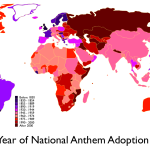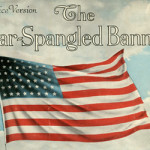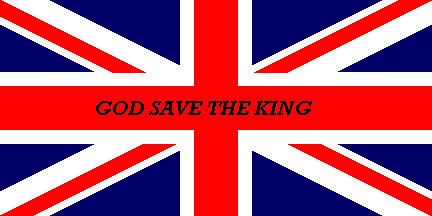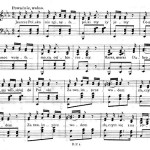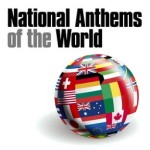Why do we need National Anthems? Seriously, are they a pre-determined requirement for statehood, and if so how are they selected? No doubt many countries took the choice very seriously and set up committees of pre-eminent scholars and composers, while others may have out it to a referendum. But how many are happy with the choice of song to represent their nation?
The World Cup in Brazil has afforded us yet another opportunity to listen to a bizarre assortment of musical manifestations of the nations of the world in the form of national anthems, played as appropriate to each match in turn. Not only that but the attitudes of players and fans alike to the respective anthems, sung generally in at least one of the languages native to that land. They are, it has to be said, are a very mixed bag: some are jaunty and jolly; some are dramatic, grandiose if not pompous; a number take themselves way too seriously; and a few verge on the dischordant.
All have cultural and historical relevance and references peculiar to the nations concerned, many to the effect of how wonderful their land, mountains and rivers, how indefatigable and resilient are their peoples – though in the case of many footballers the land is theirs by adoption rather than birth – and often exhorting peoples to strive for still greater achievement in the name of the fatherland, all of which can sound a touch sinister, particularly when performed deadpan and in total po-faced sincerity – and remember than many originated as hymns of one sort or another.
Let’s start up from with our own anthem: God Save The Queen. Let’s be honest here, musically it’s a frightful dirge with no redeeming features whatever. It’s dull, dreary, decidedly pompous, and, sad to say, instantly recognisible – which may be the alternative quality sought as an alternative to the more rabble-rousing singalong anthems like the Star-Spangled Banner, La Marseillaise and Deutschland Über Alles. You may remember that scene in Casablanca where the singing of La Marseillaise drowns out the singing of German officers, though you can’t imagine that ever happening with a tune so devoid of passion as GSTQ.
Lyrically, whatever else I might think of my country of birth and residence this awful song speaks to me, as an opponent of monarchy and an atheist, not one note, jot, whit or tittle. Even without that the nauseating sycophancy of the words are surely impossible for any thinking person to endure, no matter how fervent their patriotism:
God save our gracious Queen,
Long live our noble Queen,
God save the Queen:
Send her victorious,
Happy and glorious,
Long to reign over us:
God save the Queen.
O Lord, our God, arise,
Scatter her enemies,
And make them fall.
Confound their politics,
Frustrate their knavish tricks,
On thee our hopes we fix:
God save the Queen.
Thy choicest gifts in store,
On her be pleased to pour;
Long may she reign:
May she defend our laws,
And ever give us cause
To sing with heart and voice
God save the Queen
From every latent foe,
From the assassins blow,
God save the Queen!
O’er her thine arm extend,
For Britain’s sake defend,
Our mother, prince, and friend,
God save the Queen!
Not that anybody remembers past the first verse anyway, but you get the picture – while some May sing with lusty patriotic fervour, this monument for forelock-tugging deference should have no place in modern society.
Another point to note is that this is both the National Anthem of the UK and of England, Scotland and Wales having their own ditties. What should be the tune played for England at the football celebrations? Answer: Jerusalem – though how Blake contrived to miss the irony in his title I’m not sure. Perhaps he didn’t?
In the late 50s Flanders and Swann attempted to correct this omission with tongue firmly planted in cheek in the form of the Song of Patriotic Revenge (“the English, the English, the English are best, I wouldn’t give tuppence for all of the rest.”) Some may go ironically for the Sex Pistols‘ rather different God Save The Queen, and I can think of a host more apposite titles that might fail the taste test (Rehab, Have Mercy on the Criminal), though in the unlikely event of having to choose I would plump for something simpler and more truthful like Maggie Holland‘s beautiful and thoughtful A Place Called England:
I rode out on a bright May morning like a hero in a song,
Looking for a place called England, trying to find where I belong.
Couldn’t find the old flood meadow or the house that I once knew;
No trace of the little river or the garden where I grew.I saw town and I saw country, motorway and sink estate;
Rich man in his rolling acres, poor man still outside the gate;
Retail park and burger kingdom, prairie field and factory farm,
Run by men who think that England’s only a place to park their car.But as the train pulled from the station through the wastelands of despair
From the corner of my eye a brightness filled the filthy air.
Someone’s grown a patch of sunflowers though the soil is sooty black,
Marigolds and a few tomatoes right beside the railway track.Down behind the terraced houses, in between the concrete towers,
Compost heaps and scarlet runners, secret gardens full of flowers.
Meeta grows her scented roses right beneath the big jets’ path.
Bid a fortune for her garden—Eileen turns away and laughs.So rise up, George, and wake up, Arthur, time to rouse out from your sleep.
Deck the horse with sea-green ribbons, drag the old sword from the deep.
Hold the line for Dave and Daniel as they tunnel through the clay,
While the oak in all its glory soaks up sun for one more day.Come all you at home with freedom whatever the land that gave you birth,
There’s room for you both root and branch as long as you love the English earth.
Room for vole and room for orchid, room for all to grow and thrive;
Just less room for the fat landowner on his arse in his four-wheel drive.For England is not flag or Empire, it is not money, it is not blood.
It’s limestone gorge and granite fell, it’s Wealden clay and Severn mud,
It’s blackbird singing from the May tree, lark ascending through the scales,
Robin watching from your spade and English earth beneath your nails.So here’s two cheers for a place called England, sore abused but not yet dead;
A Mr Harding sort of England hanging in there by a thread.
Here’s two cheers for the crazy diggers, now their hour shall come around;
We shall plant the seed they saved us, common wealth and common ground.
Cruising down the titles of other anthems, it has to be said many sound dull and unimaginative, often translating as “the national anthem of…” whichever nation it happens to be, or outright simplicity (“O Canada” or “Eritrea Eritrea Eritrea” or even “Hymn”). Others mirror GSTQ (Brunei’s “God Bless the Sultan”), while some reference either fatherland or motherland, depending on what gender you ascribe to the nation, or simply homeland. A smattering focus on the people of the nation (including China’s “March of the Volunteers”), but a small proportion go way over the top in the pomposity stakes (“Cameroon, Cradle of our Forefathers” or Equitorial Guinea’s “Let us tread the path of our immense happiness” and best of all “We glorify you Pridnestrovie”). In some cases you think you know what they are getting at (India’s “Hail the ruler of all minds”), and some are chosen without any direct message (Nepal’s “Hundreds of Flowers”). Some have historical bearing (“William” for the Netherlands and the wonderfully titled “Poland is not yet lost, so long as we still live”), and there are a number where knowledge of history adds layers or irony for you (“Beautiful Rwanda” was less beautiful when millions were being massacred, for example, and on a topically prophetic note “Ukraine’s glory has not yet perished.”)
Of course it’s not just in the choice of song but also in the rendition. Many Americans took as a personal affront the Jimi Hendrix solo version of SSB, which incorporated sounds highly reminiscent of the Vietnam war, which for 1970 was as relevant and topical as it got. Again, it simply wouldn’t work with GSTQ!
So back to Brazil, where players have evidently been told in no uncertain terms to sing along to their anthem, and most have complied. However, it’s not difficult to spot those who sing with relish and gusto, the players and fans who really mean it. Some anthems are sung with such lusty fervour that the music has been turned off and the fans have carried the tune a capella. Correspondingly, these are the fans who will be most distraught when their team comes home early in abject failure.
There’s a cultural factor going on here, one aspect of which is that if any national pride is being exhibited, it is not always expressed through the singing of the anthem, where in America for example it always is. Do those with the patriotic pride play with greater passion and teamwork? Not that I can tell, though it may help – and also why some countries play like strangers at times. Would it matter if they were having a general sing-song to warm up before the match, or does it matter that it’s the national anthem they are singing?
Well I admit that even allowing for my distaste of our anthem, you wouldn’t class me as a flag-waving patriot of any description. Not that I don’t appreciate the virtues of the area in which I live, but I always took the view that I’m a citizen of the World first and Europe second, on the grounds of common humanity is the right approach – celebrate what we have in common, not what divides us. Why should we be small-minded about national boundaries or cultural norms?
Granted that cultural, racial, national and religious divisions have and still do cause wars, not to mention tribal rivalries such as those trialled at the World Cup, and that anthems are a rallying cry to the loyal and faithful. As George Orwell’s famous essay put it, “my country, right or left” – that no matter what else we disagree upon, our duty to our country is of paramount importance. Love of King and Country was of course the premise on which young men were called to arms, especially in 1914, very many of whom died seconds into their first taste of combat. How hollow the national anthem must have sounded to their loved ones. In short, there are occasions when anthems require no comment or manipulation to be ironic.
Just one point to note about these songs of allegiance: if we choose not to sing them, or to find their lyrics nauseating or offensive, does not indicate we are not good citizens or care about our country, and more than conscientious objectors want their country to be defeated in wars. Surely a national anthem should speak to all equally, regardless of background or opinions?
Ps. During the tournament Ivory Coast player Serey Die burst into tears during the national anthem. Turned out his father had died only two hours before.




